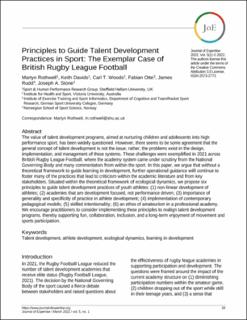Principles to guide talent development practices in sport: The exemplar case of British rugby league football
Peer reviewed, Journal article
Published version

View/
Date
2022Metadata
Show full item recordCollections
- Artikler / Articles [2119]
- Publikasjoner fra Cristin [1107]
Original version
Journal of Expertise. 2022, 5(1), Side 28-37.Abstract
The value of talent development programs, aimed at nurturing children and adolescents into high performance sport, has been widely questioned. However, there seems to be some agreement that the general concept of talent development is not the issue; rather, the problems exist in the design, implementation, and management of these systems. These challenges were exemplified in 2021 across British Rugby League Football, where the academy system came under scrutiny from the National Governing Body and many commentators from within the sport. In this paper, we argue that without a theoretical framework to guide learning in development, further operational guidance will continue to foster many of the practices that lead to criticism within the academic literature and from key stakeholders. Situated within the theoretical framework of ecological dynamics, we propose six principles to guide talent development practices of youth athletes: (1) non-linear development of athletes; (2) academies that are development focused, not performance driven; (3) importance of generality and specificity of practice in athlete development; (4) implementation of contemporary pedagogical models; (5) skilled intentionality; (6) an ethos of amateurism in a professional academy. We encourage practitioners to consider implementing these principles to realign talent development programs, thereby supporting fun, collaboration, inclusion, and a long-term enjoyment of movement and sports participation.
Description
The authors license this article under the terms of the Creative Commons Attribution 3.0 License.